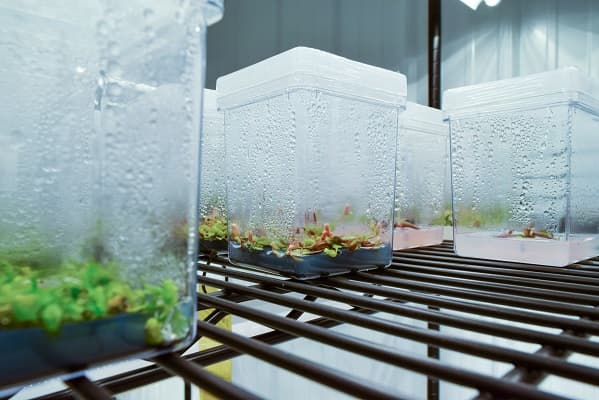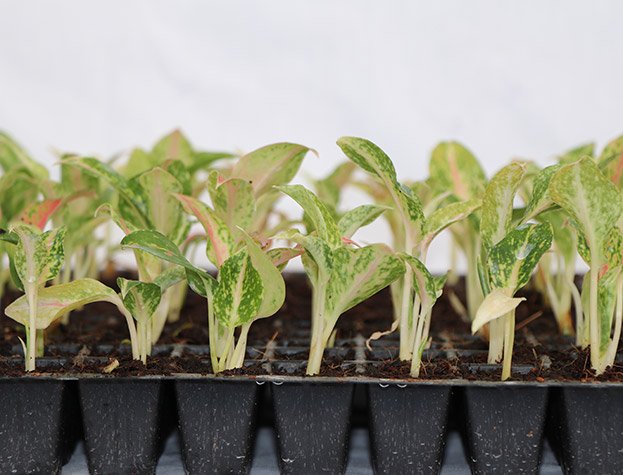Plant Tissue Culture in Iran

Plant tissue culture is one of the significant techniques of agricultural biotechnology. Asexual propagation of plants in in-vitro conditions using somatic cells means tissue culture and micropropagation.
Analysis of the state of Tissue culture in Iran
Mr. Mohammad Khayat Tehranchi, the founder of Agrinet agricultural biotechnology startup at Tarbiat Modarres University in Tehran, said about the tissue culture in Iran:
Since the late 1960s, plant tissue culture technology has been taught in Iran's universities. In the early nineties, private sector investments and the establishment of companies officially introduced plant tissue culture into the industry and the production cycle of agricultural inputs. Many companies in the private and public sectors produce all kinds of fruitful, non-fruitful, medicinal, and ornamental plants using the tissue culture method.
Following the commercial development of tissue culture, agricultural colleges throughout Iran have given more value to Tissue Culture and organized many national and international seminars, workshops, conferences, and seminars in this field.
At present, many tissue culture producers are active in Iran that produce all kinds of fruitful and non-fruitful plants, vegetative, ornamental plants, medicinal plants, etc.
Criticizing the non-observance of the necessary standards in the production of these products, the manager of the Agrinet website said: Despite the large number of companies producing tissue culture seedlings in the country, the number of producers that comply with professional principles and international standards is very low. It has caused many of the produced inputs not to have the necessary quality and not to receive positive feedback from the market and consumers.

The continuous and strict supervision of the authorities can be a convenient leverage for the manufacturers to comply with the standard principles of production.
Advantages and disadvantages of tissue culture plants
Every production in any field has its advantages and disadvantages. There is no production method without defects. The main weaknesses and strengths of tissue culture and micropropagation methods should not be kept out of sight. These advantages and disadvantages can be summarized as follows:
Advantages of tissue culture
- Production of plants free from disease and pollution
- High genetic purity of the produced plants
- Mass production in less time
- Fruiting one hand and the same plants
- Ease of harvesting products due to one hand
- Ease of using agricultural machinery and mechanization, especially in the harvesting stage
- Reduction of production costs and the total price of each seedling under the condition of mass production
- Higher resistance of tissue culture plants to environmental stresses such as cold and heat
- Ease of export due to the acceptance of the tissue culture method at the international level
Disadvantages of tissue culture
- High cost of setting up production units
- The need for expert personnel
- The need for raw materials and expensive equipment
- The possibility of genetic mutations in the produced plants

Mr. Tehranchi described the most important criteria for choosing the right plant for tissue culture production as follows:
- Propagating the plant using traditional methods, such as seeds, grafting, and offshoots, is difficult or time-consuming.
- The plant has a high commercial value or is in danger of extinction.
- The process of plant production and propagation by usual methods has limits, such as limits on the number of cuttings, cuttings, seeds, etc.
- Construction of industrial gardens where plants must be of the same type and have the same maturity and birth time.
- Areas have a lot of environmental stress, such as extreme cold or extreme heat and high salinity.
In each country, suitable plants for tissue culture production can be different. In the following, Engineer Tehranchi introduces the plants produced in Iran and the future production opportunities as follows:
Garden, ornamental, and medicinal plants have the highest production rate in our country, some of the most important of which include pear, apple, pistachio plants, seeded and seeded plants such as peaches and cherries, Date Palm, walnut, Rose, Blueberry, Aloe vera, Orchid, Ficus, Gerbera, Anthurium and all kinds of cacti and succulents.
Mr. Mohammad Khayat Tehranchi described the export opportunities for domestic producers: Considering the lower cost of energy and human resources compared to many countries, the final price of Iranian products is tempting for foreign countries, so despite the presence of bank sanctions And internationally, the number of requests to buy Iranian tissue culture plants from foreign traders is significant. Iran's neighboring countries, especially the Persian Gulf, are a suitable market for the export of these inputs. As a witness and example, a domestic company producing date seedlings using tissue culture has exported to the Persian Gulf area and the Far East.
In conclusion, the new technologies in the agricultural sector can have many job opportunities in the country. It also can increase non-oil exports.
